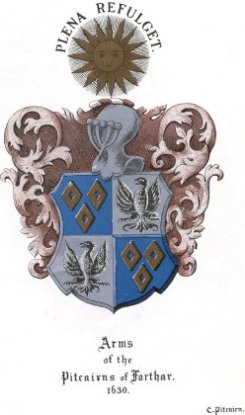|
Notes
Andrew
Pitcairn youngest son of Henry Pitcairn 15th laird.
From and early age Andrew, Robert, Patrick and David
Pitcairn, were servitors or pages to Sir Alexander Seaton,
afterwards Earl of Dunfermline.
The later had the charge of the two young children of James
VI. Andrew Pitcairn
was called servitor to the Duke of York, afterwards Charles I and
so were Robert and David. David is mentioned as a favourite of the
young Prince also.
On the 19th
day of November 1600, the Queen had given birth to a son (Charles)
at Dunfermline, and on the day of his christening he was created
Lord of Ardmanocke, Earl of Ross, Marquis of Ormonde, and Duke of
Albany; and within six days thereafter, his Majesty made a great
feast to his nobility and lords of his Privy Council and to honour
the feast the more he created Lord Livingstone Earl of Linlithgow,
Lord Seaton, Earl of Winton and Sir Robert Ker of Cessford, Earl
of Roxburgh and sundry gentlemen he knighted.
Charles
was a very peevish child, and used to annoy his parents dreadfully
by his cries during the night.
He was one night puling in his cradle, which lay in an
apartment opening from the bedroom of the King and Queen, when the
nurse employed to tend him suddenly alarmed the Royal pair by a
loud scream, followed up by the exclamation, “Eh! My bairn!”
The King started out of bed on hearing the noise, and ran
into the room where the child lay, crying.
“Hout, tout, what’s the matter wi ye, nursie?”
“Oh,” exclaimed the woman, “There was like an auld man came
into the room, and threw his cloak owre the Prince’s cradle; and
syne drew it till him again, as if he had ta’en cradle, bairn,
and a’way wi’ him. I’m
feared it was the thing that’s no canny.”
“Fiend, nor he had ta’en the girnin’ brat clean
away!” said King James, whose demonological learning made him at
once see the truth of the nurse’s observation; “gin he ever be
King, there’ll be nae gude a’ his ring [reign]; the deil had
cusen [cast] his cloak owre him already!”
This story is generally told, and in the same manner, by
the aged and more primitive portion of the inhabitants of
Dunfermline, and the latter part of the King’s observation is
proverbial in the town, it being common to say to a mislearned or
ill-conditioned person, “I daresay the deil had cusen his cloak
owre you!”
Andrew
Pitcairn was a persona grata at Court, and the first
mention of him is in a letter of King James VI to Patrick Murray,
James Rex, Royston Herts. 19th October 1612 £1800
paid by Patrick Murray, we haif assigned and be the tenoure heir
of assignes be payet to Maistr Andro Pitcarne, servitour to our
well beloved sone, the Duik of York.
Thairfoir it is oure will, and we command you the said
Patrick Murray to answer, obey, and make payment to the said
Maister Andro >Pitcairn of the sowme above written.
In 1623,
on March8th at Westminster, there was a grant to Andro Pitcairne,
Groom of the Bed-chamber, of an annuity of £200 on is surrender
of annuities of a similar amount to William Snelling, fishmonger
of London, and Elizabeth his wife.
Andro Pitcairn must therefore have been for a long time in
the service of Prince Charles and James VI for as far back as 1612
King James had given him the £1800 just mentioned, when he ws
only a boy. There
was quite a little coterie of friends and relations at Court –
Patrick, Andro, David, and Robert Pitcarne; their cousins the
three Auchmuties, John Alexander and George, Robert Ayton and the
Murrays, other cousins.
They had been much with the Earl of Dunfermline, some as
pages, and were great friends of his.
In the
year 1625 James VI died and his son Charles I was crowned King,
May 15 at Whitehall. Pensions
of £500 to the Grooms of the Bed-chamber of the late King –
namely Andro Pitcairn &c.
On 25th
Sept. 1626, at Whitehall, there is a note of a letter written by
Sec. Conway to Mr Cary, Mr Pitcairn, or Mr Kirk, sending them
instructions which are to be presented to his Majesty for
signature. On 27th
July of the same year, the King granted to Andro Pitcairn for life
the office of Master Surveyor and Keeper of his Majesty’s Hawks,
with the accustomed fee of £30 a month and 10s. per diem for
provision of meat for the hawks.
He therefore now has £500 a year annuity and £360 per
annum as Chief Falconer.
The
following are two Royal Grants by Charles I:- 1. To Andrew
Pitcairn as Gentleman Usher 2.
To Andrew Pitcairn, giving him the office of Chief
Falconer.
Pitcairn
died in 1642 and in the returns for the County of Fife on April 13
of that year, his son Charles Pitcairn was served heir.
Andrew
Pitcairn had one daughter, Janet, who was served heir to her
father, Sept. 13 1642.
|


